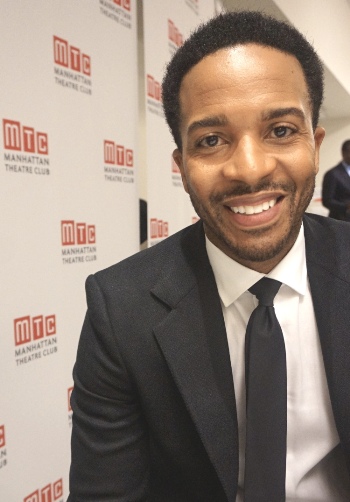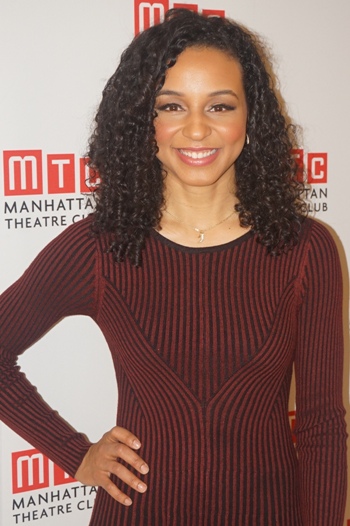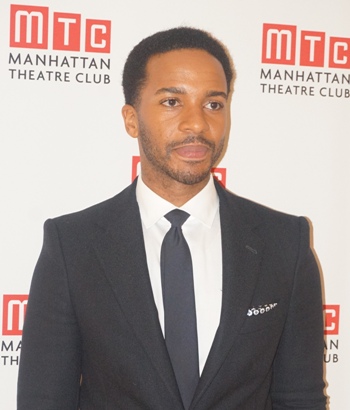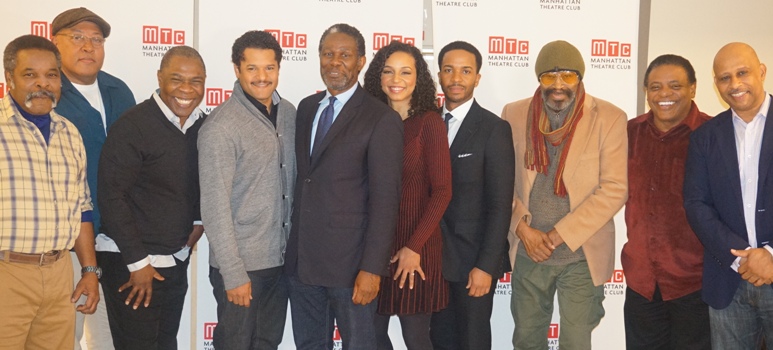Before
he died in 2005, playwright August Wilson had created the 10-play
Pittsburgh Cycle (or Century Cycle) chronicling black American life
which spanned over 10 decades. This work is not only Wilson's benchmark
but is a touchstone for fans of great theater and creative writing made
in the USA. His insights into black life ring true and offers iconic
characters that are forever haunting. Having won two Pulitzers and Tonys,
Wilson became recognized not only as the preeminent black playwright but
as one of the finest playwrights ever.
Most
recently, Wilson’s acclaimed play Fences transitioned from stage
to screen with its star Denzel Washington directing the cinematic
version, which is currently courting Oscar gold. However, Wilson’s first
script, Jitney, was the one play in the cycle that hadn't had its
Broadway debut – until now. Manhattan Theatre Club, long a supporter of
Wilson's work, has mounted a production at its Samuel J. Friedman
Theatre in New York City.
The
robust and colorful world that is Wilson's Jitney offers a
textured, profound, compelling set of narrative episodes detailing the
personal hardships and fractured relationships of several unlicensed
jitney drivers working in 1970s Pittsburgh. Threatened by the imminent
closure of their garage due to a long-considered neighborhood redo,
Wilson's stunning drama details the complexities of Black masculinity.
Tony
Award-winning director, actor and Wilson acolyte Ruben Santiago-Hudson
directs this ensemble – Anthony Chisholm (Fielding), Brandon Dirden
(Booster), André Holland (Youngblood), Carra Patterson (Rena), Michael
Potts (Turnbo), Ray Anthony Thomas (Philmore) and John Douglas Thompson
(Becker) – who are some of Broadway's best.
Within
the framework of this testosterone-charged environment, the only real
couple featured is that of Youngblood and Rena. Played by seasoned
actors André Holland and Carra Patterson, this duo provides a pivotal
element at the center of the play that merited detailed examination.
Of
course, Holland has been in the spotlight lately for a decidedly
different relationship detailed in the Academy Award-nominated indie
film Moonlight," where he introduces its lead character to gay
sex. Patterson will soon be on television in the much anticipated
scripted series on E!: The Arrangement.
Ahead of
its recent January opening, these cast members spoke about Wilson's
legacy, Black masculinity, and this particular time for Black people.
 Given
that you're the "young blood" of the play, how did you related to these
more senior gentleman?
Given
that you're the "young blood" of the play, how did you related to these
more senior gentleman?
André
Holland:
What's wonderful about it is that all of the characters have so much
dignity. Even the one character that I play, who is still young and a
bit of a hot-head, he still has a very clear idea what he wants in the
world. I really admire and love playing him.
How
would you describe your role in the play?
André
Holland:
We are working at the jitney station in 1977. [My character] comes back
from the Vietnam War to carve out a life for himself and his fiancé.
How is
it to be in a play with all these men? You're really the only woman, so
does that mean the focus goes to you or do you feel left out?
Carra
Patterson:
I don’t feel left out at all. I feel honored to be the voice of the
black woman’s experience in this world that is August’s. It's fun just
sitting around the table; it’s men bouncing that masculine energy off
each other and it’s just fascinating [to see how they behave] when a
woman enters. It changes it [when I come in].
André
Holland:
She definitely changes the atmosphere when she enters the stage.
Have you
learned a few things on how to improve your own behavior towards women
as a result of playing this character?
André
Holland:
I myself was raised to know how to treat a woman, even though there is
only one woman [here]. What’s fascinating about it is that the men in
the play spend an enormous amount of time talking about woman, even
though there aren't any three-dimensional characters on the stage. The
women shake these guys’ lives. In a variety of words in every act, we’re
talking about a woman...
Given
that you're the younger cast members what was your experience with
August Wilson? Did you have a chance to study him, because you don't
necessarily have as many years on him as some of the other cast members
do. So what did you learn, what did you gain and how did your perception
change in doing this play?
Carra
Patterson:
I haven’t had much experience. This is my first August Wilson
production, but I studied him since I was in high school. He influenced
a big decision for me to become an actress. I’ve studied Rena since high
school and in college and grad school, so I think I definitely could
play the role. It’s an honor [that playing this] role be my first August
Wilson play, and that it’s being done on this scale; I feel very
blessed.
André
Holland:
I was in one before; I was in Joe Turner’s Come and Gone on
Broadway six, seven years ago. I’ve always loved the play. I’ve read
them all but this is my second full production.
How did
that play contrast from this one?
André
Holland:
Though they’re different plays, there’s actually a lot of similarities
with the characters or thematically related family community. What does
it cost to keep these people together? Urban renewal/revitalization is a
big part of this play and that is something that a lot of the other
plays [deal with as well].
This is
happening in Pittsburgh but you come from the south. How different do
you think these men view it from your own experience?
André
Holland:
It’s not different at all. I grew up in Birmingham, which is an urban
setting just like this. Northern centers honestly are very similar to
where we are [from], because a lot of them have moved from the south up
to northern areas.
 How
do you two know each other?
How
do you two know each other?
Carra
Patterson:
I’m from Atlanta. We did a play together, so we’ve been friends ever
since. So yes, I'm very proud of Andre and Tarell [Alvin McCraney]. It’s
so wonderful they’re both working very hard, so I’m excited to see how
everything comes together.
Andre
mentioned your TV show; can you tell little bit about that...
Carra
Patterson:
It’s The Arrangement on the E network. It will be out in March
next year. It’s coming soon, but yeah, it’s a romantic thriller. I play
Shaun, who is a very fashionable lawyer with very strong opinions.
Andre,
you’re now getting the media attention for the film
Moonlight. Can you talk about that?
André
Holland:
Yes, I did a movie Moonlight which is written by a friend of
Carra’s. We met doing a play. He’s a good friend of both of ours. It’s
been a really incredible ride, really incredible. We were at the Gotham
Awards recently, which hopefully signals good things to come. The awards
are great, the attention is great, but at the end of the day, I think we
all just want to make stuff and hopefully that will help that more stuff
[gets done].
Why
haven’t there been more August Wilson plays made into film?
André
Holland:
I think that Denzel wants to do all of them. Why they haven't been
started I don't know, but I think HBO is committed to doing all of
them...
What did
you learn from your experience doing
Moonlight? Was it like or unlike doing
plays?
André
Holland:
People often think there’s a big difference between the two, but there
really isn’t. The same [issues are dealt with where it a movie or play
in the writing].
This
play will also get you a good amount of recognition. How do you feel
about awards on general?
André
Holland:
I honestly don’t care [about them] at all. I don’t give a shit about
awards. I do think that it [gives] a lot of respect and recognition to a
play. In that case, I do care. But in the case of the film awards, I
really don’t.
In the
case of this movie, especially after all the discussion, it kills
several birds with one stone addressing the gay Black experience, the
black experience in general and it being done by an independent film
maker. It’s like a trifecta.
André
Holland:
I hope people don't see it that way. I hope they just see it as a good
piece of art and don’t put on it that it has to represent all these
different things. That’s the danger of awards. They do get into this
thing, that it takes all the boxes, yet we’re done with that. This movie
Moonlight was in process long before [this] August Wilson
[production] even started. It wasn’t done in reaction to that; we were
working on that for a long time. All people need is an opportunity to
put their work out there.
 Looking
at the August Wilson canon, what do you think makes it so important? Is
it that it addressed issues that haven’t yet been addressed? Or is it
that it offered a certain look at black lives? Or that it documented a
certain social experience...?
Looking
at the August Wilson canon, what do you think makes it so important? Is
it that it addressed issues that haven’t yet been addressed? Or is it
that it offered a certain look at black lives? Or that it documented a
certain social experience...?
André
Holland:
That’s a big one. Cara, what do you think?
Carra
Patterson:
That’s pretty personal. It represents a certain part of Pittsburgh
shows’ culture. It also shows, to my knowledge, something that hasn’t
been done before. It’s all those things. I think people see themselves
in this play. Not just black people, but all people respond to the
plays.
André
Holland:
I pretty much agree with what you said...
Where do
you think Wilson got this insight?
André
Holland:
I think that comes through in the honesty of the text. In the
community. In the stories of what he had been around. I think that’s
what comes through in the words, and that's why so many people can
relate to it. These are people, characters inspired by the world that
August was surrounded by in 1977 Pittsburgh.
Your
director Ruben Santiago-Hudson has had an incredible history, especially
with Wilson. Did you guys know him before this?
Carra
Patterson:
I knew of him. I had a lot of friends who worked with him and who spoke
very highly of him as a director. And obviously I knew of his work as an
actor. This is my first time working with him. It's been wonderful.
André
Holland:
We worked together last summer in Williamstown. Ruben and I did
something together and it was a wonderful experience.
How is
it relating to someone who’s an actor and then a director?
André
Holland:
Well we’ve never acted in anything together, so I only know him as a
director. He trusts actors and he gives us our own space.
Why do
you think this is the only August Wilson play that has never made it to
the Broadway stage until now, despite the fact that it was his first
play?
André
Holland:
It’s about damn time. I first saw the play 15 years ago in London. After
I saw it, I said, “Why has this not been seen?!” Every six months or so
I write my agent and say, “Hey, what about Jitney?” I’d write
letters to the National Theatre and say, “Hey! Why don’t y’all bring it
over here?” So, I’m just grateful, especially when I see people like
Anthony Chisholm and Ruben Santiago-Hudson [involved]. These are
legends, so I’m grateful to be a part of it.
Youngblood is this amazing character. He exists in this world between
the old school and the new which is why he and Rena have this tension
that runs throughout the play. How did you approach this role?
André
Holland:
We’re still in the early days of rehearsal, but that is one of the
things that I am trying to understand about Youngblood. He is of this
new generation. He’s of the new voice. I love him. I think he has just
so much to say even about who we are as a people, regarding where we are
today. He’s a guy who has gone to serve his country in Vietnam. He comes
back to work two and three jobs, just trying to make it and piece it
together. And he’s doing it without complaint. He’s just doing it. It’s
people like that who I grew up around; hardworking, blue collar,
go-to-work-everyday black people, ones whose backs this country was
built on.
Oh
absolutely.
André
Holland:
It’s time that we hear from them. I think that August Wilson illuminates
them better than anyone I know.
 Carra,
you play Rena, the only woman in
Jitney.
What was that like for you, to get that call for the role? And what drew
you to it?
Carra,
you play Rena, the only woman in
Jitney.
What was that like for you, to get that call for the role? And what drew
you to it?
Carra
Patterson:
I’ve studied Rena since I was a teenager. Since I first decided to
become an actor. It’s the one August Wilson... His writing has so many
beautiful, black, strong female characters, but Rena is the one who I
felt closest to. I think it’s because she’s one of the younger of his
women. Being a young teenager, it was easy for me to relate to her
experience. I felt very close to this character for years. When I heard
Jitney was headed to Broadway, I was making as many phone calls
as I could. I just felt like I have to just try to be a part of this.
There were a lot of women who were fighting to get their hands on it as
well, but I was just like, “I want to see how close I could get [to
her]. It would just be an honor even to get close.” I feel very blessed
to be able to play this part and bring it to life on Broadway.
Rena is
able to break into this male space and connect with Youngblood. It's so
interesting that they want the same things, even though they go about it
differently. What did you think about the dynamic between them?
Carra
Patterson:
Just on a very surface level, when you have eight men in one room, all
of that masculine energy bouncing off of that space, it changes when she
enters just because of the simple fact that she is female. But also to
me, Rena is the one who has it the most together...
She
really does.
Carra
Patterson:
That’s just life, and I think a lot of women will be able to relate to
that. We’re always just a couple of steps ahead of our men, typically.
(laughs) It can take them awhile to get on the same page. That’s
a very human thing. And that’s what I love about August Wilson. He just
cuts right to the heart of it for the men.
Carra,
what other August Wilson plays would you like to do? Have you done other
plays from this cycle?
Carra
Patterson:
This is my first August Wilson. I’ve studied Rena a lot, but I’ve only
ever done it in acting classes, where you only get to do one scene from
it and get notes. I’ve never done a full August Wilson production. I’m
nervous, but I’m surrounded by such awesome actors. Some of them have
done all ten, so I feel like I’m in good hands.
Jitney
is set at a particular moment for black people in the ‘70s. Rena has
options that Rose from Fences, or some of
the other women from earlier plays in the cycle do not. What does that
mean to you?
Carra
Patterson:
I think August Wilson wrote Jitney first because it was probably
closest to him at the time, even though it fell later in the cycle. It’s
also appropriate that it is being debuted last on Broadway. But, I do
think Rena does represent that shift that was taking place in that era.
Women were working more. It was more of a team effort that we both do
what it takes to keep the home running. It’s not just he just goes out
and brings home the bacon. It’s not like Rose and her set up with Troy
in Fences. It’s this new way of living and being. Rena is working
and going to school, and they both need to work together. She wants to
be a part of them building their life and buying a home together. But,
[Youngblood] wants it to be the old school way. I think it’s this new
way. Society is still shifting and changing as far as figuring out what
our roles are in the home. So, I think it’s very timely...
What was
the most pivotal moment of the play for you?
Carra
Patterson:
Personally, it was the ending. The final moment. I don’t want to give it
away, but it’s that moment. The whole play is beautiful. You don't
really know what’s coming. But the final moment in the play, even just
hearing it read; it always takes my breath away. That is most profound
to me.
Email us Let us know what you think.